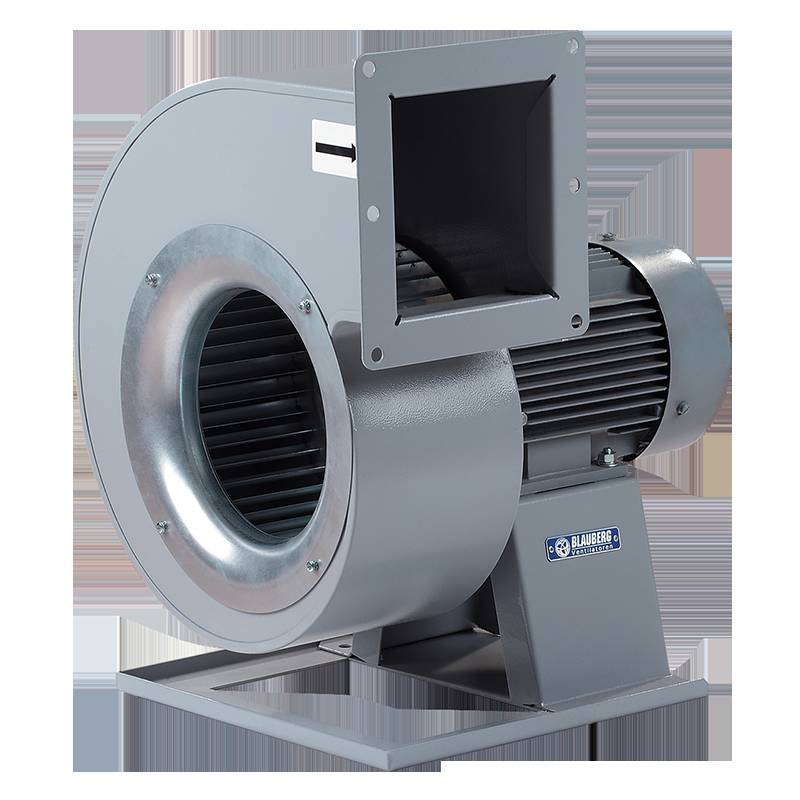Airfoil Blowers are used for a wide range of applications in many industries, hollow-bladed airfoil fans are designed, engineered and tested for use in airstreams where high efficiency and quiet operation are required. They are used extensively for continuous service at ambient and elevated temperatures in forced and induced draft applications in the metals, chemical, power generation, paper, rock products, glass, resource recovery, incineration and other industries throughout the world.
Industrial Pressure Blower Co. is known for its high qualtity industrial fans of different types, such as:
Backward Curved Fans – Efficiencies nearly as high as the airfoil design. However, single-thickness metal blades prevent the possibility of dust particle buildup inside the blade. These fans can be built with long-lasting erosion-resistant liners. The robust design allows high tip-speed operation, and therefore this fan is often used in high-pressure applications. This design frequently offers the best compromise for long life and high efficiency.
Backward Inclined Fans – Simple flat blades, but backwardly inclined to match the velocity pattern of the air passing through the fan wheel, which results in high-efficiency operation. These fans are typically used in high-volume, relatively low-pressure, clean air applications.
Radial Blade Blowers – Flat blades oriented in a radial pattern. These rugged fans offer high pressure capability with average efficiency. They are often fitted with erosion-resistant liners to extend the rotor life. The housing design is compact to minimize the floor space requirement.
Forward-Curved Radial Tip Fans – This rugged design is used in high-volume flow rate applications when the pressure requirement is rather high and erosion resistance is necessary. It offers medium range efficiencies. A common application is the dirty side of a baghouse or precipitator. The design is more compact than airfoil, backward curved or backward inclined fans.
Paddle-Wheel Blowers – This is an open impeller design without shrouds. Although the efficiency is not high, this fan is well suited for applications with extremely high dust loading. It can even be offered with field-replaceable blade liners from ceramic tiles or tungsten-carbide. This fan may also be used in high-temperature applications.
Forward-Curve Fans – This “squirrel cage” impeller generates the highest volume flow rate (for a given tip speed) of all the centrifugal fans. Therefore, it is often the smallest physical package available. It is commonly used in high-temperature furnaces.
Industrial Exhausters – Relatively inexpensive, medium-duty, steeply inclined flat-bladed fan for exhausting gases, conveying chips, etc.
Pre-engineered Fans – are series of fans of varying blade shapes that are usually available in only standard sizes. Because they are pre-engineered these fans may be available with relatively short delivery times. Often, pre-engineered rotors with various blade shapes may be installed into a common housing. These are often available in a wide range of volume and pressure requirements to meet the needs of many applications.
Pressure Blowers – High-pressure, low-volume blowers used in combustion air applications in furnaces or to provide “blow-off” air for clearing and/or drying applications.
Surgeless Blowers – High-pressure, low-volume blowers with a reduced tendency for “surging” even at severely reduced flowrates. This allows extreme turndown (low-flow) without significant pulsation.
The main types of Axial Flow Fans include:
High-Temperature Axial Fans – High-volume fans designed to operate against low flow resistance in industrial convection furnaces. These are found in either single-direction or bi-directional designs. Extremely rugged, they are most often used in high-temperature furnace (up to 1800 degF) applications.
Tube Axial Fans – Cataloged high-volume low-pressure fan line with a wide range of available sizes. Suitable for temperatures up to 250 degF.
Vaneaxial Fans – Axial flow fans with higher pressure capability due to the presence of static vanes.
Variable Pitch Axial fans – Axial fans with manually adjustable blade angles. This allows operation over a much wider range of volume/pressure relationships. The blades are adjusted periodically to optimize efficiency by matching the blade pitch to the varying conditions for the application. (Often used in mining applications).
Variable Pitch on-the-fly Axial Fans – These are similar to “Variable Pitch Axial Fans” except these include an internal mechanism that allows the blade pitch to be adjusted while the fan rotor is in motion. These versatile fans offer high-efficiency operation at many different points of operation.
Variable Speed Fans – All of the fans described above can be used in conjunction with a variable speed driver. This might be an adjustable frequency AC controller, a DC motor and drive, a steam turbine driver, etc. Flow control by means of variable speed is typically smoother and more efficient than by means of damper control. Significant power savings (with reduced cost of operation) are possible if variable speed fan drives are used for applications that require reduced flow operation for a significant portion of the system operating life.



No comments yet
Be the first to share your thoughts!